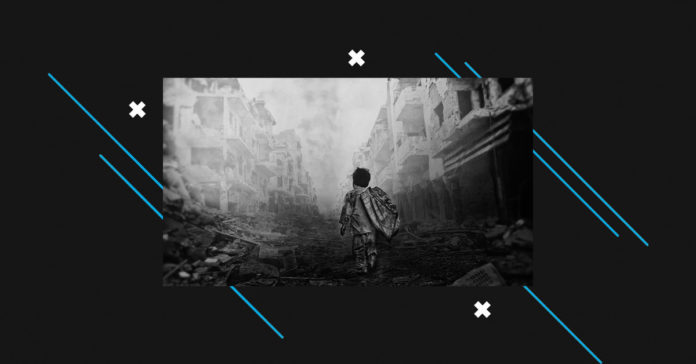If God loves us, why does He allow us to experience pain, disappointment, sickness, loss, etc.?
Is this world the best of all worlds that a Just All-Powerful God can create?
To answer, we first need to clear up some misconceptions to put things in perspective:
- This worldly life is just a station. Death is not the end of our story. It is the beginning of our real life.
This worldly life is a test, a learning academy, a place where we can grow morally and intellectually, to determine where we truly stand on issues of belief, how we serve God and what we contribute to the well-being of humanity; to separate the righteous from the wrongdoers and the truthful from the hypocrites.
This life is not about fairness, uninterrupted happiness, or justice. These belong to the afterlife. If we expect these in this life, then we are confusing Earth with Paradise; the test with the result.
- Such questions go against the concept of belief which, in essence, is the belief in a delayed outcome. Faith is not about immediate or direct results. It is a conviction in a promise by a God we have never seen for delayed rewards we cannot imagine.
- These questions ignore the collective human experience. Since when does great reward come without hardship? Medical students apply themselves to years of study instead of immersing themselves in pleasurable activity, in order to receive the reward of a medical degree and a lifetime of monetary ease. Similarly, we are promised great rewards in the afterlife in return for the hardship and strife that we endure in this life.[1]
The Prophet Muhammad, peace be upon him, told us that people who did not suffer calamity in this life will wish, in the afterlife, that they had been given the worst trials when they see the reward of those who were afflicted.
In al-Tirmidhi, Prophet Muhammad, peace be upon him, says: “On the Day of Resurrection people will wish that their skins had been cut with shears in this world, when they see the reward of those who were struck with calamity.” [Jami` at-Tirmidhi 2402.]
- Anything transient is bearable. We are created for eternal life and not for this short worldly life. Therefore, whatever hardship we suffer in this life, and however long it lasts, it is inconsequential in the context of our eternal life. Would you say that a lifetime spent in the US was terrible just because of the jet lag you suffered during the first day?
The Quran tells us that in the afterlife, our life here on Earth will seem like part of a day:
God will say: “How long did you remain on Earth in number of years?” They will say: “We remained a day or part of a day.” [Quran 23:112-113]
- Our perception is very limited. Therefore, our judgment of what is “good” or “bad” is flawed. We cannot see the big picture or the final outcome. We cannot judge a 1000-page book by reading only one paragraph. If we can see the future, we would know that the outcome of hardship for a believer is the best one possible. This is a pledge from God.
Muhammad (peace and blessings of God be upon him), said: “How wonderful is the affair of the believer, for his affairs are all good, and this applies to no one but the believer. If something good happens, he is thankful for it and that is good. If something bad happens, he bears it with patience and that is good.” [Narrated by Muslim, 2999]
- The ultimate test to know if anything was good or bad, is whether it brought you closer to God. If it did, then it was good. If it took you further away, it was bad. We know from experience that things are never good or bad in an absolute sense but are always related to a purpose. We often make decisions to choose temporary suffering for some higher good in the future. For example, we knowingly subject our children to the hardship of school in consideration of their future success and benefit, we subject ourselves to painful exercise to enjoy the benefits of a healthy body, etc. By keeping our eye on the ultimate goal, any hardship becomes bearable and acceptable.
- Every good thing has an apparently bad phase; fertile soil for crops comes from destructive volcanoes; sickness makes us appreciate health and pain makes us compassionate. Goodness comes out of seemingly bad events.
- People with handicaps are compensated even in this life. They develop formidable strength and amazing talents. Their other senses are much enhanced as a result of dealing with hardship early on.
- God does not test anyone beyond their abilities. As an example, adults and children have different pain tolerances and feel things differently. Extracting a tooth from an adult is a painful process requiring anesthesia and an operation, whereas children (who have a lower tolerance for pain) change milk teeth painlessly.
The severity of trials depends on the capability of each person. A teacher who wants the student to learn and grow gives assignments just above the current caliber of the student, enough to challenge but not too much to frustrate. Thus, the most tried and the longest-suffering people were the Prophets who present the highest caliber of Mankind.[2]
God does not charge a soul except with that within its capacity. [Quran 2:286]
Dr. Jeffrey Lang, in his Purpose of Life video, suggests that the main purpose of this earthly life, from the perspective of Islam and the Quran, is our growth in order to prepare us for the Afterlife. The ultimate goal is to grow closer to God by developing the qualities that make us better individuals. These qualities are derived from God’s attributes, e.g. Compassion, Graciousness, Peace, Love, Justice, Truth, Wisdom, Mercy, Patience, etc. God is the infinite source of all virtue.[3]
Dr. Lang points out that for a relationship to develop, the two parties must have some common ground. The greater the common ground, the stronger the resulting bond and relationship. The only possibility of common ground between humans and God lies in the moral dimension, i.e. the attributes of God: Mercy, Truth, Care, Compassion, Benevolence, Guidance, Peace, Love, etc. By cultivating these merciful attributes in our characters, we can bring ourselves closer to God.[4]
So, we can think about it in this way. Our growth in the womb was to prepare us to exist physically on Earth. Our growth on Earth is to prepare us morally for Heaven. We are not finished products yet, but rather work- in-progress.[5]
But why does this growth need an environment of suffering?
Dr. Lang points out the three necessary ingredients to the recipe of morality and growth for humans: Intellect, choice, and suffering. Through choice, we decide whether to grow through the beautiful attributes from our Creator or to grow with the opposites of these qualities (which moves us further away from God). Intellect allows us to develop and suffering provides the environment and opportunity to acquire and exercise these attributes. For example, we can develop compassion as a result of experiencing pain, patience through ordeals, courage in an environment of fear, etc. Pure gold comes from the rough ores only when it is subjected to fire.
The Prophet Muhammad, peace be upon him, visited a sick person and said, “Be cheerful, … When a Muslim is sick, God takes away his sins just as fire takes away impurities in gold and silver.” [Sunan Abī Dāwūd 3092]
Such a perspective makes suffering an opportunity rather than a nuisance.
But, why does God allow evil?
Dr. Mustafa Mahmoud, a revert to Islam from atheism, discusses the other side of evil in this excerpt from his book, Dialogue with an Atheist. He says: “God was quite capable of making us all benevolent by compelling us to obey Him. This, however, would have entailed that He deprive us of the freedom to choose. But, in His plan and Law, freedom with suffering is more honorable than slavery with happiness. That is why He let us sin, suffer, and learn; this is the wisdom in His sufferance of evil to exist.”[6]
He also says: “Evil in the Universe is like the shaded spaces in a painting. If you come very near to the painting, you will see these parts as defects; but if you draw back to take a general view of the painting as a whole, you will discover that the shaded parts are necessary and indispensable, fulfilling an aesthetic function within the structure of the artwork.”[7]
So, the real question is not how we can avoid trials, but rather, how we handle the trials in this short life test in order to elevate our positions in our real eternal life?
[Atheism – A Giant Leap Of Faith by Dr. Raida Adil Jarrar, p.16-22]
Notes:
[1] Under atheism, suffering and evil come with no reward, meaning or recourse.
[2] https://goharmukhtar.wordpress.com/2010/03/01/dr-lang-and-purpose-of-life/
[3] Dr. Jeffrey Lang is an Associate Professor of Mathematics at the University of Kansas. He is a revert
to Islam from atheism. The Purpose of Life video can be seen at: https://youtu.be/GzWRmJ-dFr4
[4] ibid
[5] https://goharmukhtar.wordpress.com/2010/03/01/dr-lang-and-purpose-of-life/
[6] Dialogue with an Atheist, Dr. Mostafa Mahmoud: https://docs.google.com/viewer?url=https://www.muslim-library.com/dl/books/English_Dialogue_with_an_Atheist.pdf
[7] ibid









